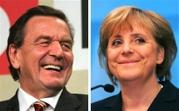
BERLIN - Conservative challenger Angela Merkel's party won the most votes in German elections Sunday but fell short of a clear mandate to govern, according to official results. Chancellor Gerhard Schroeder staged a dramatic comeback and proclaimed that he should head the next government.
The vote heralded the end of Schroeder's seven-year tenure but left in doubt who will follow. The inconclusive results make it likely that Germany's next government would be weakened because of the narrow vote margin and difficulties in forming a coalition.
But Merkel's move to become Germany's first female chancellor puts those finance reform plans in doubt. She must now find a majority in a coalition that would likely force her to water them down.
The result was a major setback for Merkel, whose party was at 42 percent in polls the week before the election.
She smiled but appeared uncomfortable as she argued that she had a mandate to be the next leader. "What is important now is to form a stable government for the people in Germany, and we ... quite clearly have the mandate to do that," Merkel said.
In contrast, Schroeder was exuberant and branded the performance of Merkel's party "disastrous."
"I do not understand how the (Christian Democratic) Union, which started off so confidently and arrogantly, takes a claim to political leadership from a disastrous election result," Schroeder said, adding defiantly that he could foresee four years of stable government "under my leadership."
With 298 of 299 districts declaring, the results showed Merkel's Christian Democrats party with 35.2 percent of the vote compared to 34.3 percent for Schroeder's Social Democrats. Voting in the final district, Dresden, was delayed until Oct. 2 because of the death of a candidate. But that outcome was not expected to affect the final result.
Merkel's party won 225 seats, three more than the Social Democrats; the Free Democrats got 61, the Left Party 54 and the Greens 51. Germany's legislature has at least 598 seats — but often more — elected under proportional representation from party lists. The outgoing parliament, for example, has 601 lawmakers.
Merkel's preferred coalition partners — the pro-business Free Democrats — had 9.8 percent, leaving such an alliance short of outright victory. The Greens, the Social Democrats' current governing partner, had 8.1 percent; together, the two parties failed to reach a majority, ending Schroeder's government.
The Left Party had 8.7 percent of the vote, but Schroeder said he would not work with them. The overall election turnout was 77.7 percent.
Both Merkel and Schroeder said they would talk to all parties except the new Left Party, a combination of ex-communists and renegade Social Democrats.
One leading possibility: a linkup between her Christian Democrats and Schroeder's Social Democrats, viewed by some as a recipe for paralysis in a country plagued by 11.4 percent unemployment. |
Schroeder, written off as a lame duck a few weeks ago, refused to concede defeat, saying he could still theoretically remain in power if talks with other parties were successful.
"I feel myself confirmed in ensuring on behalf of our country that there is in the next four years a stable government under my leadership," he said to cheering supporters at party headquarters, flashing the thumbs-up signal and holding his arms aloft like a victorious prizefighter.
Schroeder's performance was a reminder of the 2002 vote, when he came from behind to narrowly win re-election after his vociferous opposition to the war in
Iraq received public approval.
A turning point was Schroeder's performance in their only head-to-head debate Sept. 4. He hammered her tax adviser, Paul Kirchhof, for having proposed a 25-percent flat tax, even though that is not part of Merkel's program.
Merkel also was hurt by a campaign gaffe by Edmund Stoiber, leader of the Bavarian sister party the Christian Social Union. Stoiber disparaged voters in the economically struggling former East Germany, saying he did not want the "frustrated" east to decide the result.
Now, Merkel's plans to make it easier for small companies to fire people, cut payroll taxes and let companies opt out of regional wage bargaining agreements seem much farther away. Her foreign policy plans — among them, to oppose Turkish membership of the
European Union — also were up in the air.
Juergen Thumann, head of the Federation of Germany Industry, said the result was "bitterly disappointing."
"This will making governing much more difficult," he said on N-TV television.
Schroeder defiantly taunted Merkel in a joint television appearance Sunday night, saying she would not receive the post of chancellor in any deal with the Social Democrats.
"If Mrs. Merkel manages to form a coalition with the Free Democrats and Greens, I can say nothing against it," Schroeder said. "But she will not win a coalition under her leadership with my Social Democratic Party."
Asked if he would be chancellor in a left-right coalition, Schroeder answered, "How else would it work?"
If the new parliament cannot elect a chancellor in three attempts, President Horst Koehler could appoint a minority government led by the candidate with a simple majority.
ZDF projected the following division of seats: Christian Democrats, 217; Social Democrats, 213; Free Democrats, 63; Left Party, 54; and Greens, 51. More seats can be added to the lower house of parliament in Germany's system of proportional representation.
Other possibilities were an all-left government of Social Democrats, Greens and the Left Party, but a Left Party leader, Oskar Lafontaine, ruled out joining such a coalition.
Another possibility would be the Christian Democrats, the Greens and the Free Democrats.
No comments:
Post a Comment